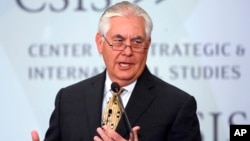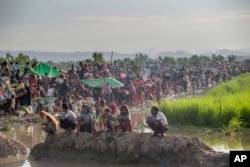U.S. Secretary of State Rex Tillerson said Wednesday he holds the military leadership in Myanmar responsible for the current refugee crisis affecting the country’s Rohingya Muslim population.
More than half a million Rohingyas have crossed the border into neighboring Bangladesh in recent weeks, fleeing a crackdown on their minority community by the Burmese military after Rohingya militants launched deadly attacks on state security forces.
The crackdown, which has resulted in widespread atrocities, has prompted intense international condemnation, though officials in Myanmar still continue to deny the crisis exists.
“We really hold the military leadership accountable for what’s happening with the Rakhine area,” Tillerson said Wednesday. “What’s most important to us is that the world can’t stand idly by and be witness to the atrocities that are being reported in the area.”
Tillerson’s comments came following a report from the human rights activist group Amnesty International, in which Myanmar security forces are accused of carrying out a systemic purge of the Rohingya people.
According to the report, which is based on interviews with more than 100 refugees, security forces shot hundreds of Rohingyas who were trying to flee their villages and burned to death the elderly and sick who were too weak to flee.
In some villages, security forces also raped or sexually assaulted women and girls, the report said.
Tillerson said “someone is going to be held to account” for the atrocities.
"And it’s up to the military leadership of Burma to decide what direction they want to play in the future of Burma because we see Burma as an important emerging democracy,” he said. “But this is a real test, it’s a real test to this power-sharing government as of how they’re going to deal with this very serious issue.”
Amnesty researcher Matthew Wells said the group will publish another report in the near future detailing individual criminal offenses, including specific commanders and others that may be involved in abuses.
According to Wells, doctors have treated hundreds of Rohingyas for gunshot wounds that are consistent with people being shot from behind as they fled.






